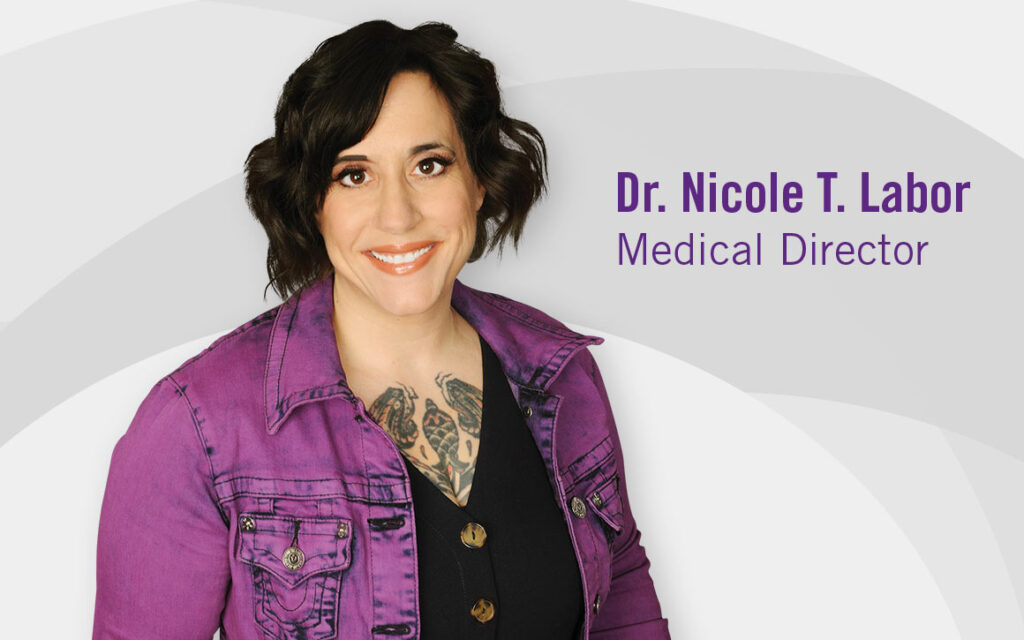From addictoholic to Addiction Medicine Doctor

As a culture, we don’t treat addiction like we treat other illnesses. The stigma associated with a person struggling with substance use is still pervasive. Today, there are too many people – even in the medical community – who consider addiction a choice, or a moral failing. Imagine having a physician who can not only sympathize and identify with your condition, but personally identifies and understands the complex issues surrounding a program of recovery. This is Dr. Nicole Labor.
She describes herself as a recovering addictoholic. “My life was chaotic and rapidly deteriorating. I was fortunate that when I went to treatment, I was allowed to finish school – as long as I stayed in treatment, went to meetings and stayed in therapy,” Dr. Labor explained. At that time Dr. Labor was in medical school and addiction medicine wasn’t a nationally recognized specialty. “Before I went to residency, I had decided that I wanted to do addiction medicine, probably for the same reason that everybody that ever had an addiction wants to treat addiction,” Dr. Labor added. “Because everybody thinks they’re an expert, just because they did it. And it was really no different for me.” Today, Dr. Labor is a Board-Certified Family Medicine Physician, Board-Certified Addiction Medicine Physician and the Medical Director at OneEighty.
Understanding the science behind addiction
Dr. Labor wanted to understand the science behind what makes addiction a disease. “My focus has been on the dumbing down of the neurobiology of the brain,” Dr. Labor expressed. “Really understanding how the brain works and what’s happening in addiction. That, to me, has been the guiding force in treating addiction,” she continued. “We know addiction is an isolating disease. We know that it leads people to become more introverted,” Dr. Labor offered. “Part of the treatment is the extroversion and the socialization and the integration with others, the networking and the reconstruction of the brain when someone has addiction,” Dr. Labor continued. “Addicts are wired to be impatient and demanding. They don’t know how to cope with things, not being fixed immediately. Their brain believes that, a chemical or an instant fix is the answer to all the problems. And so, part of treatment is teaching them the skill of patience and delayed gratification.”
Changing behaviors, gaining a better way of life
Doctor Labor works to teach clients how to behaviorally manage their problems, instead of constantly needing a chemical or controlled substance to fix their feelings of circumstances. “It has really required working with each individual and asking which part of the addiction has gotten them in its grip. I’m always asking myself, ‘How can we work with that aspect and work to change that particular problem while teaching them all the skills?’” Dr. Labor went on to explain that everybody needs to learn these important life skills at some point, but with an addict, issues like impulse control can be much harder to master.
“I focus on which symptom represents the biggest conflict and how we will treat that symptom,” Dr. Labor offered. “But we’re still treating addiction as a disease and we’re addressing the whole disease. That means they need to stay away from substances. We’re abstinence focused. There’s also harm reduction, which is a different treatment. But with abstinence-focused treatment, we’re working with clients to help them cope with life in the middle of chaos and confusion. How do you handle being stressed and how do you handle your emotions that you haven’t dealt with for years?” Medication-Assisted Treatment (MAT), along with counseling, behavioral therapies and medical evaluation are treatment options to help address opioid withdrawal and cravings. Dr. Labor went on to explain that treating addiction can be a complex process. That’s why it’s vital to seek personalized support during the recovery process.
Recovery is a personal journey
Dr. Labor explained that the issues of addiction are really skills that everybody must learn, at some point in their life. “Some people have terrible boundaries or interpersonal skills. Some people are just really, truly impatient and have no ability to wait for anything,” she explained. “They don’t know how to handle things that haven’t happened… expectations. Right. They struggle more than anything. So, we really focus on that. Not only are we trying to help people make healthier decisions we’re trying to get them to understand why they should make healthy decisions. And we’re taking a hard look at what makes their current decisions unhealthy.” Her approach really focuses on looking at each individual and determining which are the core issues for that person. Some can’t handle anxiety and stress very well. So, Dr. Labor works with her clients to develop a plan of care that helps them hone-in on those skills that can have a positive, life-altering impact.
We’re here to support you
We help people change direction with programs for addiction, domestic violence, rape crisis, mental health, housing, and prevention and education. OneEighty strives to offer a safe and welcoming environment to the LGBTQIA+ community – offering a counseling staff with a wide range of backgrounds and specialties, including those that work with the LGBT community.
At OneEighty, we actively support an evidence-based approach to sustainable recovery from trauma and addiction – restoring dignity and purpose, reimagining potential and rebuilding lives.
OneEighty Resources:
OneEighty Resources
For those encountering a substance use crisis, please call OneEighty’s Substance Use Crisis hotline, available 24 hours per day, 365 days per year, at 330-466-0678. For other resources, click the links below:
